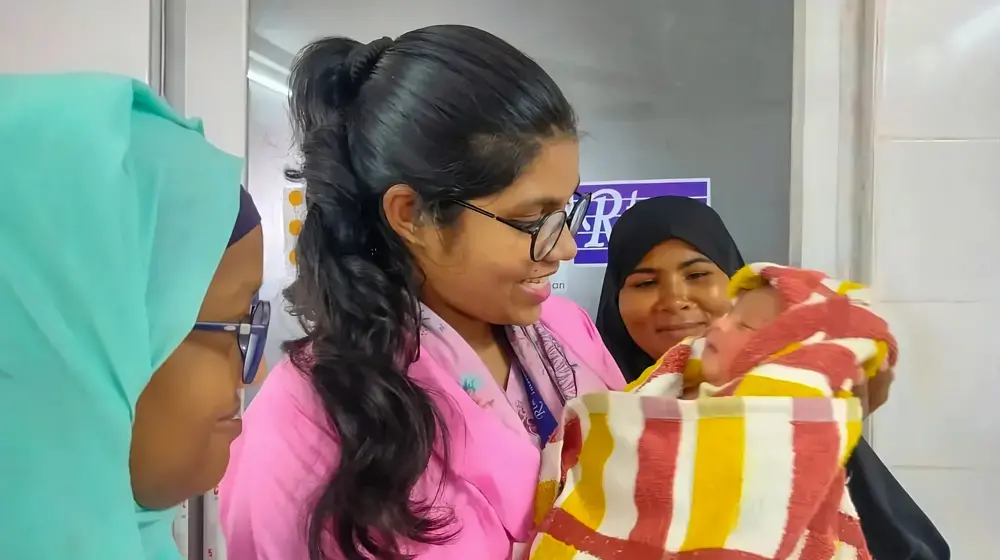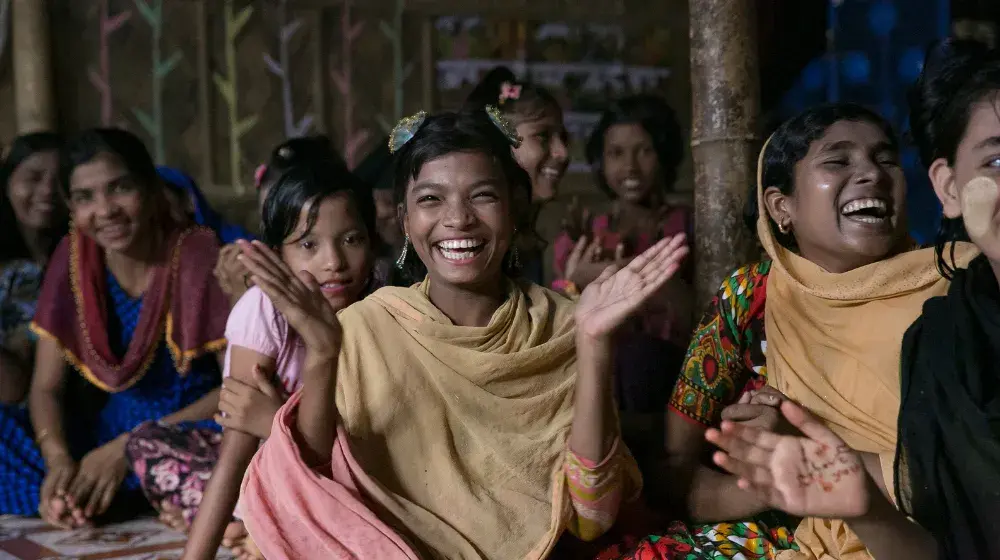"The patient’s condition was critical. She was expecting twins with an A negative blood group, which can be lethal. I am glad that both the mother and twins are safe and sound,“ said a midwife at the maternal health strategy dissemination programme. UNFPA Representative Dr Asa Torkelsson met both the mother and midwife at the unveiling of the National Maternity Strategy Paper 20-21 and the SOP Campaign for Maternal Health Management and distribution of EMONC awards by the Department of Health was organized on November 4th at the Grand Ballroom, Pan Pacific Sonargaon Hotel.
In Bangladesh, approximately 5 mothers die every day while giving birth; effords to ensure safe motherhood and reduce maternal mortality remain vital. With the implementation of multi-functional measures of the Government of Bangladesh to prevent maternal mortality, the death rate has gradually decreased.
The Bangladesh National Strategy for Maternal Health with SOPs 2019-30 has been developed with the help of UNICEF, UNFPA, DB3UHO, USAID and Save the Children, under the management of the Maternal and Neonatal Heath Care (MNCAH) programme of the Department of Health led by the Ministry of Health and Family Welfare to prevent maternal mortality and improve maternal health services. In addition, USAID and Save the Children have created SOPs to manage maternal health.
The Bangladesh National Maternity Health Strategy 20-21 and SOP will play an important role in guiding the Ministry of Health and Family Welfare and other stakeholders in resolving maternal health and other issues. The award was given to the winners in recognition for their special contribution to maternal health.
Dr. Asa Torkelsson, UNFPA Representative and special guest addressed these issues and said, “Equity and access are vital to the provision of maternal healthcare. We need to develop evidence-based local level interventions to ensure equity in health care services for all women and girls, providing family planning, maternity care, newborn care, sexually transmitted infection and cervical cancer screenings, adolescent-friendly services, and gender-based violence prevention and response. We at UNFPA are working with the government and relevant stakeholders to facilitate the provision of quality and respectful maternal care which includes ANC, delivery care, EmONC, and post-partum care. Furthermore, our work also includes support to post-partum family planning which aims to ensure healthy spacing and timing to avoid unwanted pregnancies.”
The Constitution of the People's Republic of Bangladesh guarantees the protection of the health of all citizens, irrespective of age, gender, race, religion and caste. Special emphasis is placed on maternal healthcare in all the laws and policies that the government has formulated to provide integrated and quality healthcare to all citizens. This Strategy Guide provides some new directions that will contribute directly and indirectly to the overall maternal health service.
The government is giving great importance to maternal health management and future well-being. Operational plans of both the MNCAH and the MCRAH of the Family Planning Department of the Ministry of Health and Family Welfare have given greater importance to adolescents' maternal health care and improvement.
The National Directorate of Health and Family Welfare, Department of Family Planning, Family Planning Directorate and other ministries, other government and non-governmental organizations, development partners, and various stakeholders will contribute to the overall development of maternal health services in Bangladesh using the National Maternity Health Strategy 20-21 and SOP.
Mr. Zahid Maleque, MP, Honorable Minister, Ministry of Health and Family Welfare, Government of the People's Republic of Bangladesh attended as the Chief Guest. The program was presided over by Prof. Dr. Abul Kalam Azad, Director General, Health Department.
Dr Mohammad Shamsul Haque, Line Director, MNC & AH, Department of Health, Mohakhali inaugurated the event with the opening remarks.
The keynote speech was given by Dr. Md. Mosher-ul-Islam, Deputy Director, Department of Health and Program Manager, Maternal Health, Directorate of Health.
The guests of honor who spoke included Dr Bardan Jung Rana, Representative, WHO, Tomoo Hozumi, Representative- UNICEF and Xerses Sidhwa, Office Director-Office of Population, Health, Nutrition, and Education (OPHNE), USAID.
The special guests who spoke included Prof. Dr. Said Modashre Ali, Chairman, Community Clinical Health Assistance Trust, Former Advisor to the Hon'ble Prime Minister, Md. Asadul Islam, Secretary, Department of Health Services, Ministry of Health and Family Welfare, Mr Sheakh Yusuf Harun, Secretary, Medical Education and Family welfare division, MOHFW, Quazi A. K. M. Mohiul Islam, Director General, Directorate General of Family PlanningAlam Ara Begum, Director General, Directorate General of Nursing and Midwifery, Dr. Mostafa Jalal Mohiuddin, President, Bangladesh Medical Association, Prof. Dr. M Iqbal Arslan President, Swadhinata Chikitsak Parishad, Dr. Md. Ehteshamul Huq Choudhury Secretary General, Bangladesh Medical Association and Prof. Dr. Mahammad Abdul Aziz Secretary General, Swadhinata Chikitsak Parishad.
Among others who were present included represenatives from the Ministries of Health and Family Welfare, Department of Health, Directorate of Family Planning, invited guests of other ministries, UNICEF, UNFPA, DOB4UHO, USAID and Save the Children's officials, representatives of various government and non-governmental organizations, development partners, development partners, stakeholders and print media journalists.




